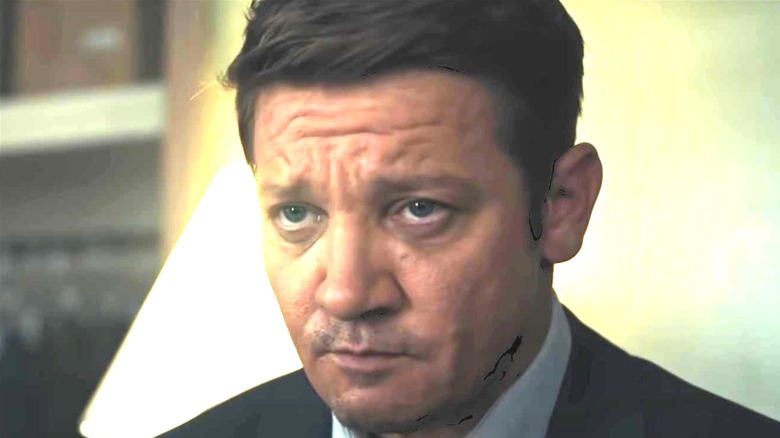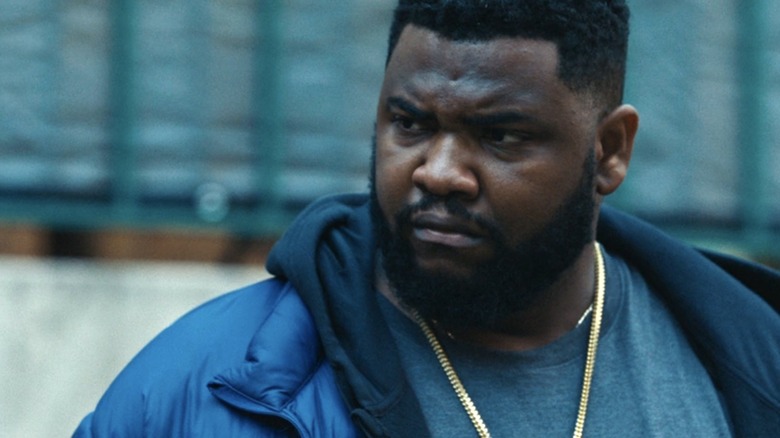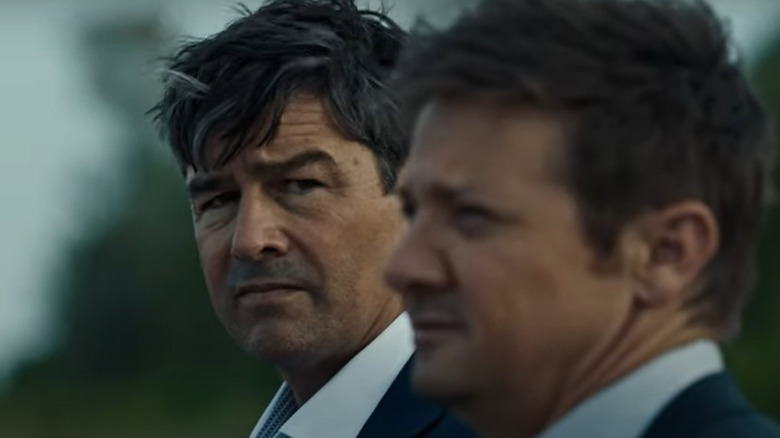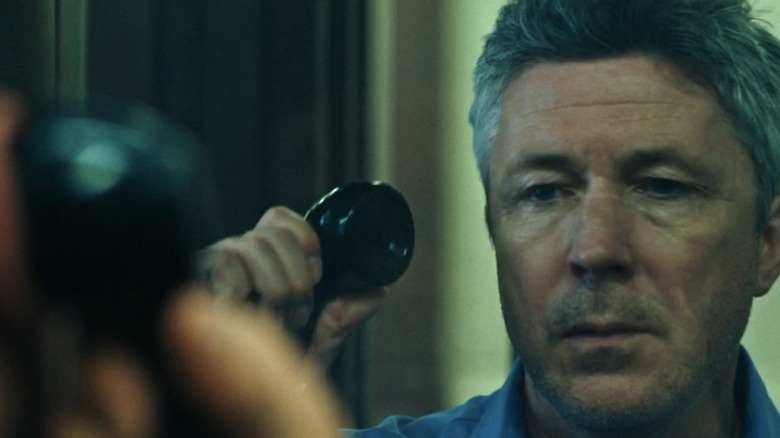The Ending Of The Mayor Of Kingstown Season 1 Explained
This article contains spoilers for the Season 1 finale of "The Mayor of Kingstown."
"The Mayor of Kingstown" is another testosterone-driven vehicle from Taylor Sheridan, the co-creator of "Yellowstone." The series, set in a Rust Belt town with seven prisons located within a 10-mile radius, centers around Mike McLusky (Jeremy Renner) in the titular role, a man who serves as a go-between for prisoners, law enforcement, guards, and politicians.
Mike is a man who desperately wants out of Kingstown but can't bring himself to leave, serving as his brother Mitch's (Kyle Chandler) right-hand man until Mitch is murdered. Mike steps in to "tie up loose ends," although it's not entirely clear what they are. However, he quickly finds himself scrambling to hold together a prison and town that are both coming apart at the seams.
In the Season 1 finale of "The Mayor of Kingstown," Mike's negotiating skills are put to the test as he deals with a deadly uprising at the prison. The finale shines a spotlight on Mike's mistakes throughout the season and explores the failings of a prison system rife with corruption and violence. Here's a deeper look into what happens during the Season 1 finale of "The Mayor of Kingstown."
Mayor of Kingstown finale showcases Mike's failings
The riot is a culmination of everything Mike does wrong throughout the season. A self-professed advocate for prisoners, Mike's real job is to maintain the status quo, a cog in the wheel of a broken system that is beyond repair. He runs around negotiating with the heads of the warring factions to keep the violence on the inside of the prison from reaching a tipping point. Although Mike claims not to have a side, he ultimately does what's best for his tribe –- the cops he grew up with.
The decision to recruit the different factions of the inmate population to murder a drug addict and child killer is one Mike is reticent to make, knowing this Faustian bargain will blow up in everyone's face, but he does it because it's what the cops want. As the prisoners begin to demand what is owed to them, Mike urges prison guard Ed Simmons (James Jordan) to come down hard on the inmates to remind them of their place in the food chain. However, it's the leader of the Black group that Simmons targets most harshly, reinforcing that the systemic racism that exists outside the prison is amplified on the inside.
Bunny (Tobi Bamtefa) warns Mike that their treatment of P-Dog (Pha'rez Lass) will "wake the beast," but Mike's response is simply, "At least the beast is in the cage." Bunny is speaking metaphorically, with the "beast" being generations of rage and oppression, but it's one person to Mike.
The riot marks Mike's day of reckoning
In the finale, Mike is put in a position to accept responsibility and right some of his past wrongs. Previously, as all signs point to a bloody clash between the prisoners and the guards, Mike throws his hands up, claiming it's not his fault because he's been warning everyone who will listen that the day of reckoning is coming. In what should be Mike's finest hour — his chance to diffuse the situation by admitting culpability on his and the guards' behalf — he fails.
Viewers may have trouble mustering empathy for criminals on a murderous rampage, but P-Dog isn't someone looking for forgiveness or making excuses for his actions. He's speaking in hard truths that nobody wants to hear. It's what Miriam McLusky (Dianne Wiest) speaks about in her lectures peppered throughout the season. The U.S. was built on the subjugation and mistreatment of minorities, and the cycle continues today. "Mayor of Kingstown" reveals that prison isn't a self-contained microcosm. There's a symbiotic relationship between what happens inside and what's going on in the world. It's a place where prejudice flourishes, making rehabilitation impossible. It's where the men behind bars aren't treated as humans, which makes them behave accordingly.
In the end, Mike gets off the hook because the prisoners' actions overshadow his failings. Only a second season will show if he learns that the system can't be held tenuously together by a series of quid pro quos.
Milo's endgame remains a mystery
The relationship between Milo Sunter (Aidan Gillen) and Mike is hard to untangle. Milo had a longstanding relationship with Mitch, and it's unclear if Mike was on the inside when it started. Milo's interest in Mike feels like it goes further back than Milo's attempts to recruit Mike into a similar arrangement, an errand boy on the outside to further his murky agenda. At first, Milo's goal appears to convince Mike to recover his lost money, but his interest in Mike grows deeper, and the Russian gangster dispatches Iris to manipulate Mike. When that fails, he drags Mike into a case involving a serial killer.
There are a lot of parallels between Gillen's character on "Mayor of Kingstown" and his turn as Petyr "Littlefinger" Baelish on "Game of Thrones." The wheels are constantly turning, and he's an opportunist who is one step ahead of everyone else. Milo contributes to the chaos and uses it to his advantage to escape unnoticed, and there's no doubt he hasn't finished with Mike or Iris.
Sheridan tends to eschew motives in favor of a universal understanding that bad people simply do bad things, so despite Milo being a primary antagonist throughout Season 1, viewers have no idea what his endgame is and how or why Mike factors into it moving forward. It's worth noting that Milo proves to be the only inmate with a motive worth uncovering while the rest are painted with much broader stereotypical strokes.
Iris and Mike are two lost souls
There may be no more tragic character on "Mayor of Kingstown" than Iris (Emma Laird). Milo uses Iris to gain leverage over his adversaries, including Mike, but when she fails, he sells her to the Duke (Andrew Howard), whose gang inflicts unspeakable horrors upon her. She turns into a broken bird who Mike feels compelled to protect, although we never fully understand why. Their connection is thinly drawn, and with both characters' backstories largely unexplored, it comes down to two damaged people thrown together to provide a romantic subplot.
Despite Mike's role as a supposed savior, the bear roaming his property is a perfect example of Mike's mistakes. In trying to overcome his fears, he creates a monster. Whether he thinks he's doing a good thing feeding a beast despite warnings otherwise, or he acts impulsively, not thinking of long-term ramifications, the bear symbolizes Mike's shortcomings as an advocate, peacemaker, or whatever he believes himself to be.
While he's gone, it's Iris who has to face the creature, in the same way the inmates suffer the consequences of Mike's actions in his absence. Iris' encounter with the bear offers an opportunity for introspection. She admits to Mike that everything she has endured has chipped away at her soul, but in a rare moment of optimism, she questions whether a soul can regenerate. Like Iris, Mike's soul suffers wear and tear, but his bear is P-Dog, and it's unclear if Mike can heal or if future seasons will leave him void of a soul altogether.




